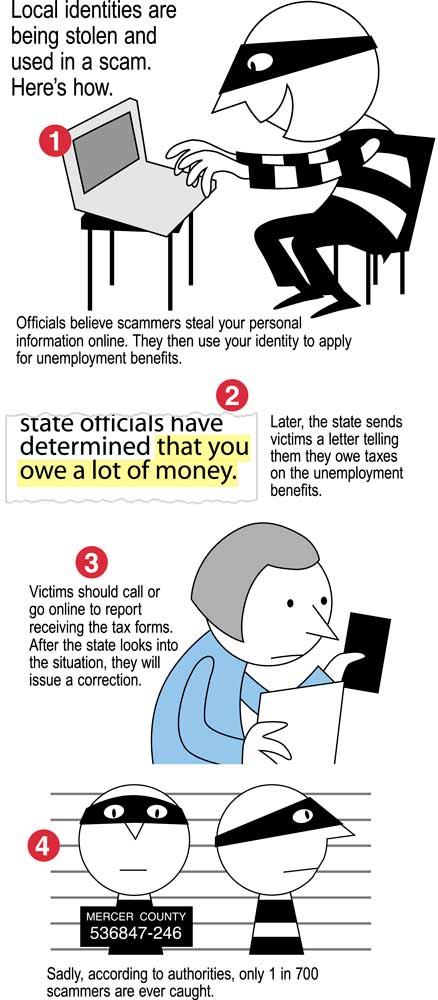Local officials have been dealing with a glut of fraud or scam-related calls as reports of fraudulent tax forms related to unemployment benefits continue to come in.
The issue was noted in late January, when local law enforcement offices began receiving dozens of calls a day from locals who claimed they'd received tax forms for unemployment benefits they'd never applied for.
Based on call logs from the Mercer County Central Dispatch, some of the forms were sent to people who had reportedly been retired for years. Others who'd received the forms said deceased spouses or family members had been listed as recipients of the benefits.

Here is how unemployment fraud happens and residents are affected by the scam.
Last month, the Ohio Department of Job and Family Services issued 1.7 million 1099-G tax forms to individuals in whose names unemployment benefits were paid in 2020. The department has recently stated that many of the individuals receiving loans were never paid unemployment benefits and did not know their identity had been compromised until they received a 1099-G form.
On Thursday, the ODFJS announced that an increase in initial unemployment claims filed in the first week of February is suspected to be due to continued fraudulent activity. According to a news release, 140,444 new unemployment claims had been filed Jan. 31-Feb. 6 - a 194% increase from the prior week. As of Thursday, 44,000 claims had been flagged under suspicion of fraud and were under review, but even more of the 140,444 new claims were anticipated to be fraudulent.
"All of the claims will be reviewed, which will create delays in processing some legitimate claims," the release read.
The agency has stated it is taking steps to implement more robust identity verification in the traditional unemployment program.
Some other states have experienced similar issues with fraud, which officials believe to be driven by identity theft. Scammers have used the personal information of victims to file fraudulent claims in both the traditional unemployment and Pandemic Unemployment Assistance programs, according to ODJFS.
People can report these fraudulent forms using a toll-free hotline at 833-658-0394 or an online portal at unemployment.ohio.gov, which is a recommended first step in taking corrective measures. If after an investigation the agency finds the claim was fraudulent, they will issue a correction to the Internal Revenue Service and issue a confirmation email to victims with resources on dealing with identity theft and steps that can be taken to protect their identities in the future.
Under federal law, unemployment benefits are taxable income. The IRS is advising taxpayers who received fraudulent 1099-G tax forms seek a revised form from their state agencies.
"Taxpayers who are unable to obtain a timely, corrected form from states should still file an accurate tax return, reporting only the income they received. A corrected Form 1099-G showing zero unemployment benefits in cases of identity theft will help taxpayers avoid being hit with an unexpected federal tax bill for unreported income," an IRS news release states.
Some resources for those looking to protect their identities from theft are available at ohioattorneygeneral.gov/identitytheft or identitytheft.gov. It is also recommended that people who suspect their identities might have been compromised check their credit report at annualcreditreport.com.

